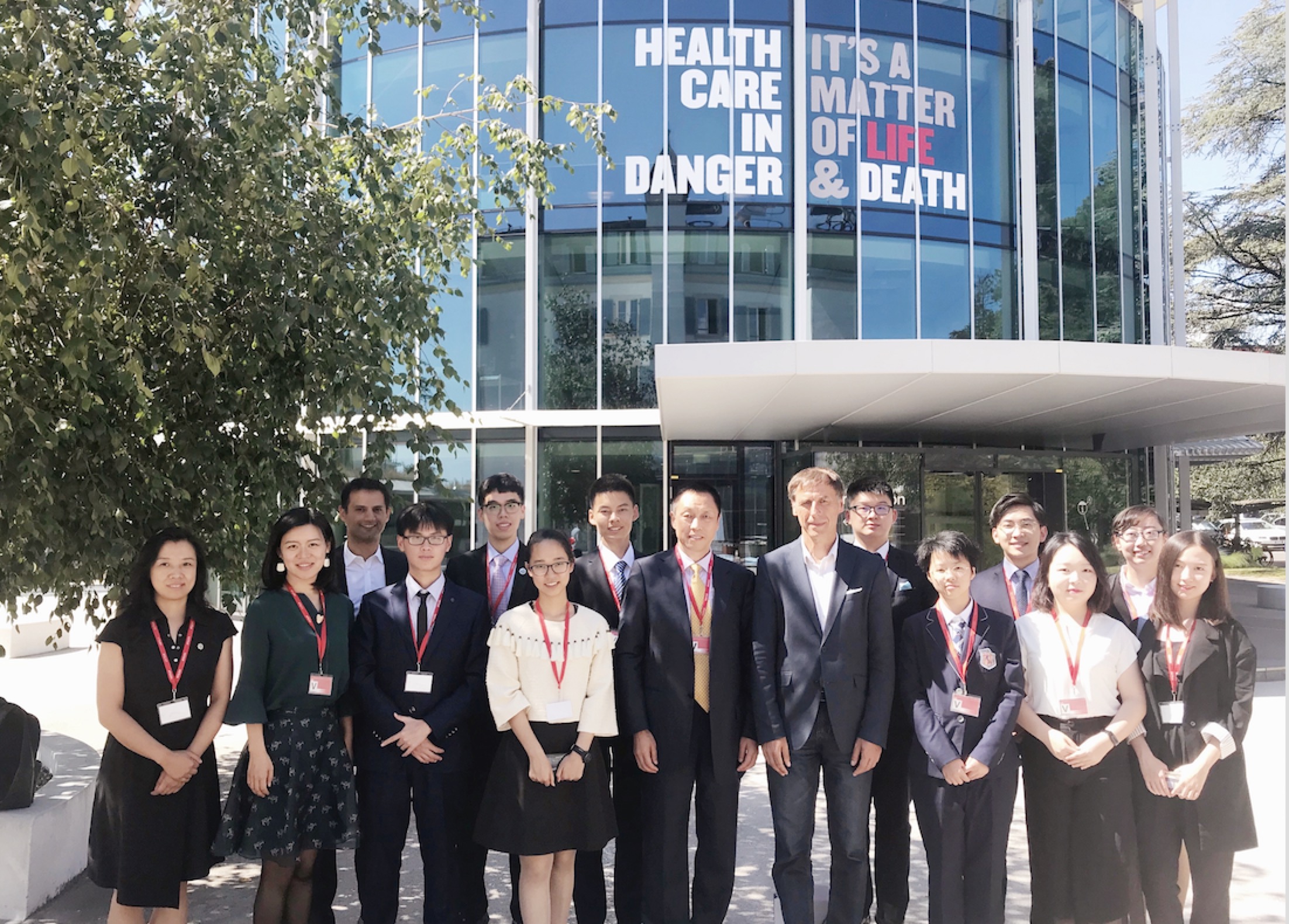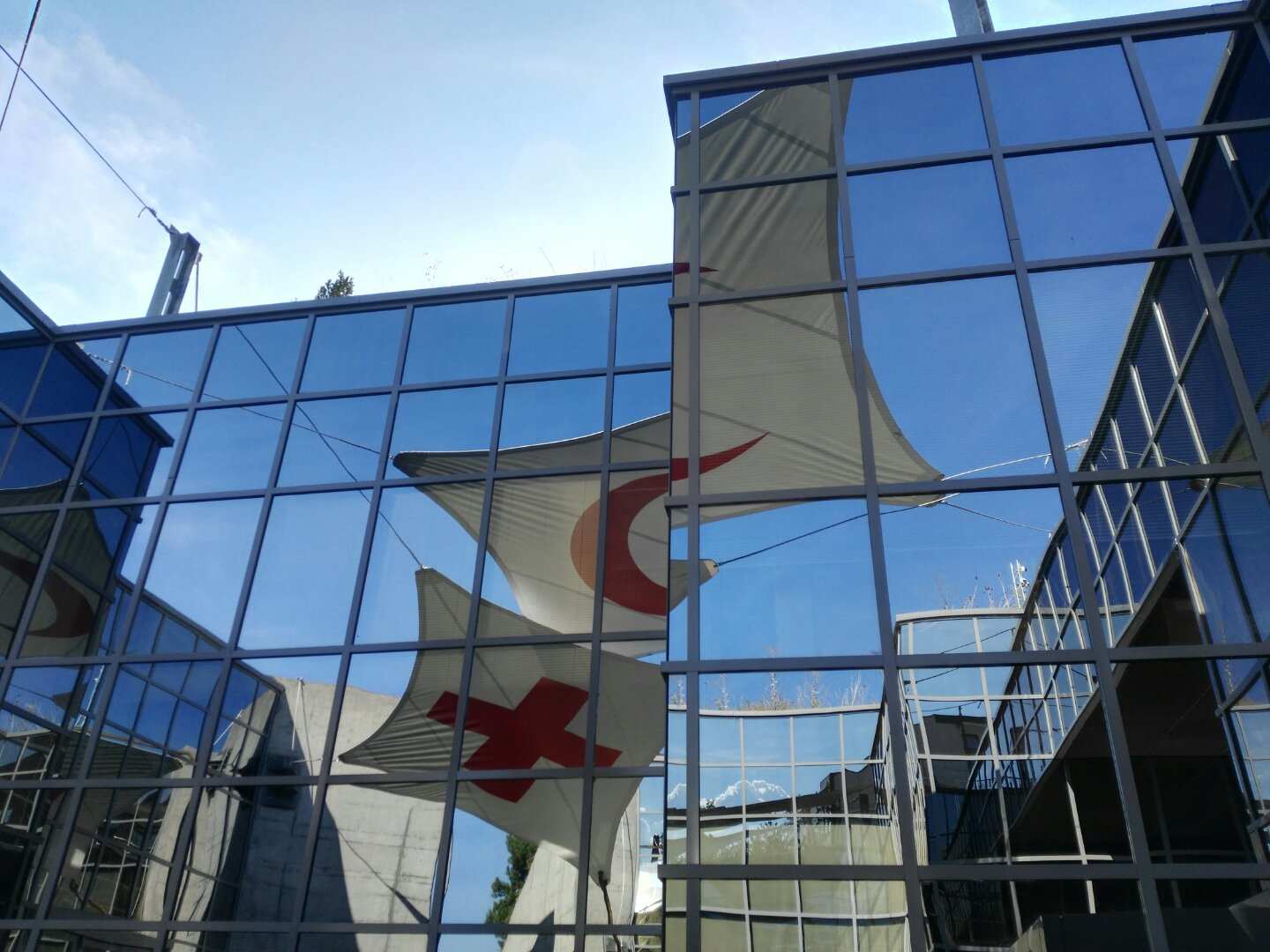The “Experience the U.N.” International Youth Delegation visits WTO and International Committee of the Red Cross
The “Experience the U.N.” delegation visited the World Trade Organization (WTO) and the International Committee of the Red Cross (ICRC) on July 18, 2018, the third day of their Geneva tour.
Yi Xiaozhun, deputy director-general of the WTO, met with the students and said that this was the first delegation of Chinese students he has ever received. He said he was happy to see the future faces of China’s multilateral diplomacy. It is under the backdrop of a stronger China, which is playing a more and more important role on world stage, that the young students could have the opportunity to experience the UN and the operation of multilateral diplomatic work at the frontline. He commended the Beijing Wu Jianmin Foundation (WJF) on its efforts to cultivate international talents and to promote multilateral diplomacy. He expressed hope that the students could cherish the opportunity and grow into visionary diplomatic elites like late Ambassador Wu Jianmin, so as to contribute to China’s multilateral diplomacy.

A Group Photo of the Delegation with Deputy Director-General Yi Xiaozhun
Deputy Director-General Yi shared his own experience in the field. He recounted the difficult journey of China’s recession to WTO. He said that it is not a coincidence that China strongly supports multilateralism and champions multilateral trade system. China’s own reform and opening-up, as well as China’s development, are the best testimony of the benefits of the multilateral world trade system. The decade since joining the WTO saw the fastest growth of China, which in turn contributed to the development of world economy and the advancement of the world trade system. He insisted that every country must defend the world trade system because there are no winners of trade wars. Ultimately, countries should play by the rules of the multilateral trade system and, when a dispute arises, the countries concerned should refer to the dispute settlement mechanism. The rules of the system must not be bent or harmed for the benefits of any one country, he said.
Ms. Ankai Xu, an economist at the WTO, explained to the students the basic principles and operation structure of WTO. She explained that, in order to maintain a fair and mutually beneficial world trade system, the organization adheres to a set of principles including non-discrimination, predictability and transparency. WTO also has a complete set of dispute resolution mechanism, a negotiation-based platform for member parties to resolve their frictions. She also explained the “social value” principle during dispute arbitration as well as the waiver towards reciprocal regional organizations.
Mr. Mark Koulen, strategy and policy expert of WTO, talked with the students about the reform of the organization. He explained the challenges facing the WTO, pointing out that the biggest challenge is the dispute resolution mechanism itself. He also accounted for the conflict among the countries in the free trade system. There is a need to reform the WTO rules so that the WTO will become more flexible and focused on resolving disputes through negotiations and deliberation. The recent trade conflicts among major powers highlighted the issue of reform, but the WTO has yet to develop a clear reform plan. It will be a difficult process till all the countries concerned reach a consensus about reform. He spoke highly of the two important remarks President Xi Jinping made in Davos and Geneva in January 2017, and expressed hope that China would play a more active leading role in the reform and development of the world trade system.
In 1947 when it was formed, the WTO (GATT) had only 23 members, a small organization covering 70 percent of the world trade. Today it has grown to be a truly global organization with 164 members and covers 98 percent of the world trade. It is playing an important role in multilateral diplomacy and free trade. The students learned that China should defend the WTO and position itself within the world trade system, advocate for free trade that is fair and equal, oppose unilateralism and protectionism, so as to contribute to the joint development of all countries.

Roundtable with WTO experts
In the afternoon, the delegation visited the ICRC, where they attended two roundtable meetings and visited the Red Cross Museum.
Mr. Jacques Pellet, Special Envoy of the ICRC President on China Affairs, welcomed the students and said that he hoped more and more young people from China could participate in the humanitarian endeavour. China has always been a strong supporter of the Red Cross. As China plays a more important role in international affairs, the Red Cross is looking forward to closer cooperation with China, he said.

The delegation visits the ICRC
In the first roundtable meeting, Mr. Simon Schorno, coordinator of the Asia Pacific region, introduced the work of Red Cross in the region. The 18 member countries in the Asia Pacific region not only provide political and economic support to the Red Cross, but also humanitarian support in the diplomatic field. Mr. Schorno emphasized that the three principles of the Red Cross – independence, neutrality and fairness–enable the organization to play an active role in all kinds of conflicts, engage in secret dialogue and negotiations with different countries so as to work towards a resolution to disputes and to provide humanitarian rescue.
When asked what drives the Red Cross to provide humanitarian support all these years, Mr. Schorno answered that besides cooperating with other development actors, the Red Cross was also able to cooperate with different countries on humanitarian work because of its neutrality. When asked how do they guarantee that the goods get delivered to those in need, he explained that the Red Cross has autonomy over allocation before delivering the goods. The Red Cross is also different from other NGOs because it is not controlled by any government, and therefore could access the people directly. The major concern is the protection of experts such as medical personnel recruited directly or in cooperation with different countries. The only protective measure is to approach the local stakeholders before sending personnel to target areas so as to gain their understanding and support. He explained that the biggest challenge facing the Red Cross is long-term assistance and the way of accessing such areas.
Mr. Jacques Pellet also explained China’s relationship with the Red Cross International Commission. An important reason behind this close relationship is that China is the only one of the five permanent members of the Security Council that is not engaged in wars. China believes that development could bring peace, which matches the philosophy of the Red Cross. Mr Pellet hoped that China could better allocate and manage the doctors, goods and personnel it dispatched to assist African countries. As more people from China participate in the field work, humanitarianism would spread even further in China. The Red Cross has also suggested that China’s “Belt and Road” initiative pay more attention to unsafe areas. The Red Cross has developed a business guide in conflict areas, which deals with the humanitarian aspect of the “Belt and Road” initiative. Mr. Pellet also explained that the designation of China coordinator shows that the Red Cross highly values the peace of China and the global perspectives of its young people. The Red Cross hopes to build a better relationship with China, he said.
In the second roundtable hosted by Mr. Ramin Mahnad and Ms. Isabelle Gallino, legal advisors of ICRC, they both explained the relevant international humanitarian law and their significance. The international humanitarian law is part of the international laws. It is based on international conventions and aims at protecting civilians. It puts restrictions and sets rules on wars and is applicable to times of armed conflicts. Ms. Gallino clarified that it is illegal for countries to start wars other than on grounds of self-defense. During wars, countries should abide by the Geneva Convention. She also distinguished what constitutes international conflict through examples. She emphasized that the Red Cross and the general public need to become aware and engage in discussions about the international humanitarian law, so that it can play a better role.
After the roundtable, the students visited the International Red Cross Museum. Testimonies from actual witnesses and well-designed exhibitions left the students a deep impression and helped them learn about the significance of humanitarian work.

The Red Cross Museum



